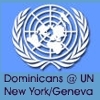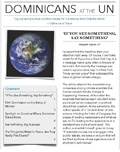

| BRIEFING - June 4, 2014 | To learn more about the Millenium Development Goals, click on the graphic Read the latest “Dominicans at the UN” newsletter Past Briefings: May 7, 2014 April 9, 2014 March 19, 2014 March 5, 2014 Feb 19, 2014 Jan 8, 2014 Nov 22, 2013 Oct 23, 2013 Oct 9, 2013 Sept 25, 2013 Sept 11, 2013 July 10, 2013 June 26, 2013 June 12, 2013 May 8, 2013 April 24, 2013 |
|
A report from the Indigenous Peoples Forum By Abby McCrary, Dominican Volunteer The 13th Session of the Indigenous Peoples Forum took place at the UN Headquarters in New York last month with discussions and negotiations between stakeholders, governments, and indigenous representatives from all over the world. Distinct challenges faced by these marginalized communities were highlighted, including unemployment, poor education, low access to services, and poverty. One exceptional workshop was sponsored by the International Council on Mining and Metals (ICCM) to facilitate dialogue between indigenous community leaders and corporate representatives. The workshop delved into the complexities of resource extraction and the process of consultation and consent from indigenous communities. The process of engaging these communities in the past has often been fraught with desperation, misunderstanding, and pain. Issues of trust are a major hindrance which prevent opportunities for both companies and indigenous peoples. Indigenous populations fear a loss of culture, infringement of land rights, degradation of natural beauty and integrity of the earth, and violence against local women and girls. However, because many of these populations are impoverished, economic development and progress in the form of extracted resource sales for the community is a strong incentive to allow companies access to land for mining, drilling or fracking. But how do these negotiations take place, and who participates in them? These were central questions in the workshop, with the hope that the indigenous and corporate representatives would come away with a more clear strategy of communication for future resource exploration prospects. As external actors, corporations often have little to no cultural knowledge of the communities with whom they aim to do business. This brings challenges to negotiations at two levels. First, corporations need to be advised on how to approach situations in which traditional rights are not recognized by the state, or where tension exists between traditional representatives and elected officials. Secondly, at the local level, it is essential that a process exists for consent which is inclusive of the group in all its diversity. Women are among the marginalized groups whose perspectives must be embraced. A process needs to be constructed in order to create space for these voices. If community members were able to share their concerns, as well as their hopes, perhaps a deal could be agreed upon (or rejected) to ensure that these specific needs are met. A gender-sensitive and inclusive type of engagement toward consent, one that has historically not been present, would cultivate greater community participation and power in decision-making. A method such as this would likely require time and educational resources in order to inform all community members of the stipulations of an agreement which affects their land. However, the investment would certainly be worthwhile if it prevents future misunderstandings and conflict at multiple levels. More broadly, there is a crucial need for companies to move away from a philanthropic approach to dealing with indigenous peoples, and towards a strategy of sustainability. Rather than seeing the consultation process as a dichotomy of profit-maximization and cultural preservation, all stakeholders could join together in inclusive dialogue for the common goal of long-term sustainability.
|
Dominican Leadership Conference
Building relationships and collaborating in the mission of preaching the Gospel
29000 West Eleven Mile Road
Farmington Hills MI 48336
248-536-3234 Contact: Executive Director

